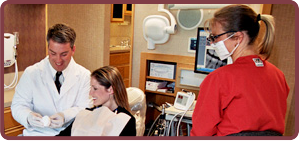 It’s easier than ever to achieve the smile of your dreams because you have many options to choose from when it comes to cosmetic dentistry. However, veneers continue to rank among the top elective procedures year after year. Applying thin shells to the front sides of your teeth covers several imperfections at once. Your new smile can last for a decade or longer with the correct care. Although your teeth will be covered, you can’t stop brushing or flossing because you can still get cavities. Here’s how to keep tooth decay at bay to ensure your picture-perfect smile thrives for years.
It’s easier than ever to achieve the smile of your dreams because you have many options to choose from when it comes to cosmetic dentistry. However, veneers continue to rank among the top elective procedures year after year. Applying thin shells to the front sides of your teeth covers several imperfections at once. Your new smile can last for a decade or longer with the correct care. Although your teeth will be covered, you can’t stop brushing or flossing because you can still get cavities. Here’s how to keep tooth decay at bay to ensure your picture-perfect smile thrives for years.
Can Veneers Get Cavities:
Veneers are made of porcelain because it closely looks like enamel. Not to mention, it’s strong, durable, and resistant to stains. Veneers also can’t get cavities, but your underlying teeth are still vulnerable to decay. Cavities can occur on the back sides of your teeth where the veneers don’t cover. It’s easy for a cavity to go undetected until it turns into a big problem because it can be hard to see. Decay can also occur where the veneer meets the gum line. Although cavities are the most chronic oral health problem, your oral health and veneers don’t have to fall victim to decay.
Combating Decay with Veneers
Besides keeping your teeth healthy, the lifespan of veneers also relies on how you care for them. Your cosmetic dentist will recommend choosing a soft-bristled toothbrush and nonabrasive toothpaste to brush twice daily. Abrasive dental products can scratch veneers, which can make them look discolored and trap harmful bacteria. You’ll keep your veneers looking their best by using the right dental products and committing to brushing for 2 minutes in the morning and at night. Don’t forget to floss between each tooth daily to remove any plaque left behind by your toothbrush.
It’s also important to watch what you eat and drink. Limit your consumption of sugary foods and drinks, which feed cavity-causing bacteria. It’s a good idea to skip hard or chewy foods to prevent damaging your veneers. Your dentist will also suggest avoiding alcohol because it can weaken the bonding material holding your veneers in place. Bacteria can seep in through small cracks in the cement, leading to decay underneath the veneer.
Most importantly, don’t forget to visit your dentist every 6 months for a cleaning and checkup. They’ll remove any buildup missed at home and look for anything concerning, like enamel erosion. Your dentist will address the issue while it’s small to promote your oral health to get the most out of your investment.
About Dr. H. Douglas Clark III
Dr. Clark earned his dental degree from the Marquette University School of Dentistry and has regularly continued his education in advanced care, like cosmetic dentistry. He has completed training from the Las Vegas Institute for Advanced Dental Studies and Spear Education. Dr. Clark is a proud member of many professional organizations, including the American Academy of Cosmetic Dentistry. Contact our office today to request a consultation.









